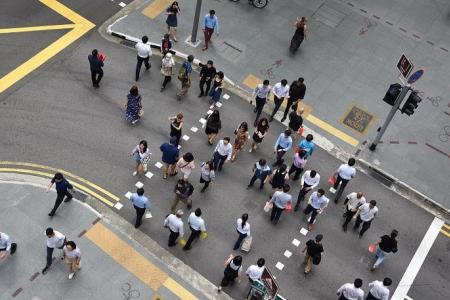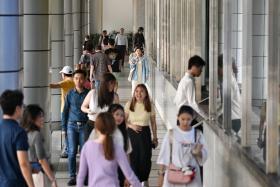Job hopping in Singapore at its lowest in 6 years
Jumping ship has gone out of fashion among local workers with job switching at its lowest level in six years.
Only 14.7 per cent of workers changed jobs in the past two years, a rate not seen since 2017.
The chances of landing a new post have dimmed due to the weaker economic environment, despite a tight labour market.
The fall in job change was seen across all age groups, in white-collar and blue-collar posts and across industries, noted a Ministry of Manpower survey on Jan 31.
Workers aged 25 to 29 – a group still exploring options in their early careers – continued to change employers most frequently.
About 13.9 per cent of this cohort had moved in the 12 months up to June 2023, compared with 5.5 per cent for workers in their 50s and 3.7 per cent for those over 60.
As fewer workers decamped, the share of employees with a tenure of less than one year fell from 17.9 per cent in 2022 to 16.4 per cent in 2023.
Job moves went down in all industries last year, but workers in sectors such as information and communications, and administrative and support services switched posts more than others.
Around 50 per cent of workers had racked up at least five years in their current job, noted the survey, which also found that employees aged over 50 were more likely to have worked in the same firm for at least 10 years.
The ministry attributed the rise in long-staying employees to training, reskilling and policies such as the Retirement and Re-employment Act, which supports older workers who want to stay employed.
It remains to be seen if job prospects stay subdued in 2024.
The Straits Times recently reported that according to LinkedIn data, 86 per cent of professionals here are contemplating a new job in 2024, up 15 percentage points from 2023. The professional networking platform based its findings on a poll in November and December 2023 of around 1,000 respondents aged 18 to 77.
Ms Betul Genc, who heads the Asean region for recruiter Adecco, said bosses have got better at retaining employees since the pandemic.
“Businesses started to broaden their focus beyond monetary compensation, considering factors like overall professional development, career progression plans, corporate culture and hybrid work arrangements,” she noted.
“This might have a positive impact on retention.”
She expects both bosses and workers to keep an eye out for opportunities in 2024. If presented with exceptional talent or promising career opportunities, she expects neither party to say no.
Amid the reversal of fortune for workers and the waves of layoffs, Mr Aslam Sardar, chief executive at the Institute for Human Resource Professionals, urged human resources officers to focus on driving productivity and keeping workers.
“Rather than focusing on replacing weaker talent, organisations could explore redesigning roles and promoting internal mobility,” he said.
“While it may seem opportune to reorganise, restructure and replace weaker talent, it is important to consider the potential impacts on employee morale, employer branding and long-term organisational health.
“The investment in employees’ learning and development remains paramount for sustained growth.”
The MOM findings also showed a decline in training hours for both those working and the unemployed, and across all age groups, which it attributed to a fall in online training.
About 43.5 per cent of workers took up training in 2023, down from 49.1 per cent in 2022. This statistic had hovered around 50 per cent since 2017.
The MOM report said Singapore’s job market remained competitive, with a high ranking among developed countries, despite a decline in employment due to economic challenges.
Efforts to narrow the wage gap had borne fruit, with the real income growth for lower-wage workers outpacing that of the median worker, while policies to promote flexible work also raised workplace participation by women.
About 12.2 per cent – a record low – of workers chose self-employment in 2023, while 87.8 per cent opted to work for others.
The trend could be explained by more job opportunities and economic uncertainties, the MOM noted.
Like the rest of the world, the poll found that Singapore employees are working less, clocking 41.9 hours a week, down from 45.3 hours in 2013. However, as part-time work is less common here, they are still on the clock longer than their peers in similar high-income economies.
Get The New Paper on your phone with the free TNP app. Download from the Apple App Store or Google Play Store now


